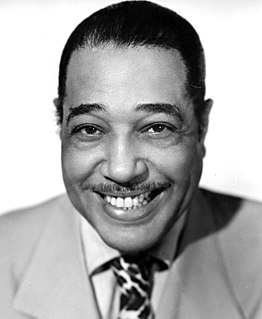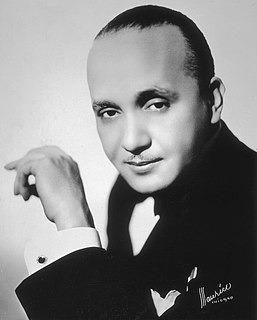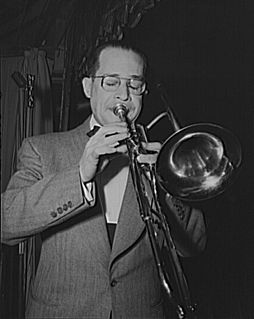Related Research Articles

Edward Kennedy "Duke" Ellington was an American composer, pianist, and leader of his eponymous jazz orchestra from 1923 through the rest of his life. Born in Washington, D.C., Ellington was based in New York City from the mid-1920s and gained a national profile through his orchestra's appearances at the Cotton Club in Harlem. A master at writing miniatures for the three-minute 78 rpm recording format, Ellington wrote or collaborated on more than one thousand compositions; his extensive body of work is the largest recorded personal jazz legacy, and many of his pieces have become standards. He also recorded songs written by his bandsmen, such as Juan Tizol's "Caravan", which brought a Spanish tinge to big band jazz. At the end of the 1930s, Ellington began a nearly thirty-year collaboration with composer-arranger-pianist Billy Strayhorn, whom he called his writing and arranging companion. With Strayhorn, he composed multiple extended compositions, or suites, as well as many short pieces. For a few years at the beginning of Strayhorn's involvement, Ellington's orchestra is considered to have been at its peak, with bassist Jimmy Blanton and tenor saxophonist Ben Webster briefly members. Following a low-profile period, an appearance by Ellington and his orchestra at the Newport Jazz Festival in July 1956 led to a major revival and regular world tours. Ellington recorded for most American record companies of his era, performed in and scored several films, and composed a handful of stage musicals.
Wellman Braud was an American jazz upright bassist. His family sometimes spelled their last name "Breaux", pronounced "Bro".

James Fletcher Hamilton Henderson was an American pianist, bandleader, arranger and composer, important in the development of big band jazz and swing music. He was one of the most prolific black musical arrangers and, along with Duke Ellington, is considered one of the most influential arrangers and bandleaders in jazz history. Henderson's influence was vast. He helped bridge the gap between the Dixieland and the swing eras. He was often known as "Smack" Henderson.

Albany Leon "Barney" Bigard was an American jazz clarinetist known for his 15-year tenure with Duke Ellington. He also played tenor saxophone.
James Wesley "Bubber" Miley was an American early jazz trumpet and cornet player, specializing in the use of the plunger mute.

Lawrence Brown was a jazz trombonist from California best remembered for his work with the Duke Ellington orchestra. He was a session musician throughout his career, and also recorded albums under his own name.

Alonzo "Lonnie" Johnson was an American blues and jazz singer, guitarist, violinist and songwriter. He was a pioneer of jazz guitar and jazz violin and is recognized as the first to play an electrically amplified violin.
Elmer Chester Snowden was an American banjo player of the jazz age. He also played guitar and, in the early stages of his career, all the reed instruments. He contributed greatly to jazz in its early days as both a player and a bandleader, and launched the careers of many top musicians.

Billy Taylor was an American jazz pianist, composer, broadcaster and educator. He was the Robert L. Jones Distinguished Professor of Music at East Carolina University in Greenville, and from 1994 was the artistic director for jazz at the John F. Kennedy Center for the Performing Arts in Washington, D.C.

Wilbur Dorsey "Buck" Clayton was an American jazz trumpeter who was a member of Count Basie's orchestra. His principal influence was Louis Armstrong, first hearing the record "Confessin' That I Love You" as he passed by a shop window.
Victoria Regina Spivey, sometimes known as Queen Victoria, was an American blues singer and songwriter. During a recording career that spanned 40 years, from 1926 to the mid-1960s, she worked with Louis Armstrong, King Oliver, Clarence Williams, Luis Russell, Lonnie Johnson, and Bob Dylan. She also performed in vaudeville and clubs, sometimes with her sister Addie "Sweet Peas" Spivey, also known as the Za Zu Girl. Among her compositions are "Black Snake Blues" (1926), "Dope Head Blues" (1927), and "Organ Grinder Blues" (1928). In 1962 she co-founded Spivey Records.

Hamiet Bluiett was an American jazz saxophonist, clarinetist, and composer. His primary instrument was the baritone saxophone, and he was considered one of the finest players of this instrument. A member of the World Saxophone Quartet, he also played the bass saxophone, E-flat alto clarinet, E-flat contra-alto clarinet, and wooden flute.

William Alonzo "Cat" Anderson was an American jazz trumpeter known for his long period as a member of Duke Ellington's orchestra and for his wide range, especially his ability to play in the altissimo register.

William Alexander "Sonny" Greer was an American jazz drummer and vocalist, best known for his work with Duke Ellington.

Juan Tizol Martínez was a Puerto Rican jazz trombonist and composer. He is best known as a member of Duke Ellington's big band, and as the co-writer of the jazz standards "Caravan", "Pyramid", and "Perdido".

Harold "Shorty" Baker was an American jazz trumpeter.

Tyree Glenn, born William Tyree Glenn, was an American trombone and vibraphone player.
Leonard Richard "Len" Kunstadt was an American scholar of jazz and blues music, and a record label manager.

Sam Woodyard was an American jazz drummer.
Ronnie Burrage is an American jazz drummer. His style draws from jazz, funk, and soul.
References
- 1 2 3 4 5 6 Colin Larkin, ed. (1992). The Guinness Encyclopedia of Popular Music (First ed.). Guinness Publishing. p. 1677. ISBN 0-85112-939-0.
- ↑ "The Story of Louis Metcalf," by Len Kunstadt (1925–1996), Record Research, Robert Colton & Len Kunstadt (1925–1996), eds., Issue 46, October 1962, begins on p. 3; ISSN 0034-1592
- ↑ "Louis Metcalf". Discogs.com. Retrieved 2019-01-27.